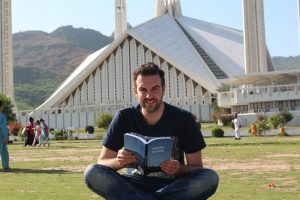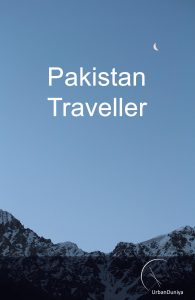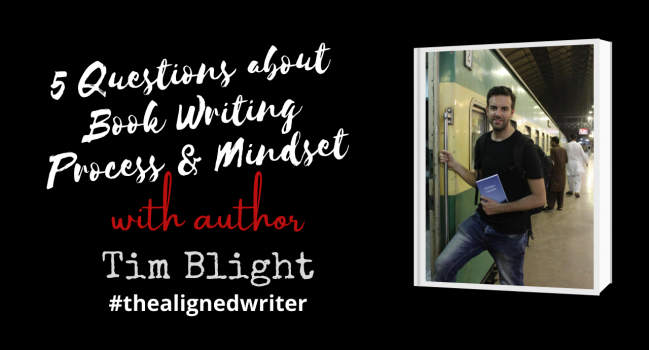Author Interview with Tim Blight: 5 Questions about Book Writing Process & Mindset
Practice makes perfect, and lots of practice really matters, says Tim

In this author interview series “5 questions to ask an aligned author“, we stumbled upon the very adventurous author—Tim Blight—from Australia who shared with us his book writing process and mindset tips along with some common lack mindset traps for aspiring and emerging authors.
In the second edition of his current, well-researched, practical and most comprehensive travel guide Pakistan Traveller—the author dares us to take the road less traveled and discover the intriguing beauty and diverse culture of the Islamic Republic of Pakistan through the eye of a keen wanderer and a mindful traveler at heart and in mind.
Tim Blight is an Australian English teacher and global traveller who fell in love with Pakistan from his first visit in 2006. He is the founder of travel blog UrbanDuniya.com, and author of two self-published non-fiction books.
Apart from this, Tim’s writing has been published several times in Dawn, The Frontier Post and Humsafar Magazine, on articles ranging from the exquisite Bhong Mosque in southern Punjab, and an odyssey in the Thal Desert, to a motorbike journey across the Karakoram Range and travel options in Kuala Lumpur.
He is passionate about travel and the positive effects that tourism can have on “off the beaten track” destinations, and is currently working on future editions of Pakistan Traveller to draw more global attention to the beauty of Pakistan and its history and culture.
Pakistan Traveller
BLURB

Dare to take the road less travelled with the world’s most comprehensive travel guidebook to Pakistan! Discover this intriguing and diverse country with the second edition of this fully researched, up-to-date travel guide.
From the atmospheric streets of Lahore’s frenetic walled city, to the isolated forts of the Cholistan desert and the glacier-carved peaks of the Hunza Valley. From the dancing sufis at the evocative shrines in Sindh to the colourful and unique traditions of the Kalash.
This guidebook covers Pakistan in nine fascinating regions; – Lahore and Eastern Punjab – Islamabad and Northern Punjab – Faisalabad and Western Punjab – Multan and Southern Punjab – Karachi and surrounds – Sukkur and Interior Sindh – Abbottabad and the Kaghan Valley – The Chitral Valley – Gilgit-Baltistan There are listings of recommended sights, hotels, eating spots, transport information and health facilities in each location, from the big cities down to the smaller towns.
5 Author Interview Questions about Book Writing Process & Mindset Answered
#1 Do you have another career besides being a writer? If so, can you tell us how it contributes to your writing?
I teach English as a second language! I find it really useful in terms of my writing, because over the years I’ve come to appreciate how language works, not just English but any language. I’ve developed an appreciation for words and their meaning, and the way grammar, register and tone can shape meaning.
It does make me a little paranoid, however, because I don’t consider myself a stereotypical “literary-type”, but being an English language teacher there’s certainly a bit of expectation that things should be spelled correctly or the grammar and punctuation should be sound… which isn’t always the case.
#2 Do you view writing as a kind of spiritual practice?
I don’t know about a spiritual practice, but I certainly find it therapeutic!
I do believe that whatever anyone writes, somehow is imbued with a bit of their spirit, or perhaps is a product, manifestation or realisation of their spirit. I also write for different moods… last year I was writing a lot about my journey to Makkah and Madinah for my umrah… that was no doubt from a spiritual place. Other times, for example when I was writing my reference guide to Pakistan, it’s more factual and worldly, but I guess you could argue that my love for Pakistan and travel is part of my spirit too.
#3 What book has most influenced your writing?
It wouldn’t be just one book, or even a type of text. For my travel guide, I’m no doubt inspired by the Lonely Planet guidebooks of the late 1990s and early 2000s; with sometimes brutally honest reviews of hotels, restaurants and attractions that took me on my first journey abroad. Recent editions of LP have been more polished and tidy, which makes them more marketable, but in my opinion they have lost some of the quirkiness which made them fun to travel with.
Religious poetry in Urdu really affects me, as it does in Farsi (the little that I understand)… and finally in writing my cookbook Recipes for Ramadan, I found inspiration in Nigella Lawson and her loving descriptions of the food she makes. I want to read recipes which have a story to them, and which the chef really seems to enjoy not just making, but also eating.
#4 Do you think someone could be a writer if they don’t feel emotions strongly?
Yes, definitely. There are different types of writing.
I do think that feeling strong emotions would help to write fiction and prose, however, but it can’t be just that—you need to be able to express them in a way that is meaningful (even if it only means something to you). It’s definitely the strong emotions that have pushed me to write some things in the past, which I wouldn’t have done had I felt nothing. My writing last year became very emotional as I wrote about my umrah, and at other times in the past it has been emotional (such as some amateur poetry I’ve pieced together, or some musings about pain and loss).
However, my Pakistan travel guide doesn’t come from a very emotional place. The only emotion involved is really just the love for the country and travelling—which drives me. However in the actual words, aside from my opinions in certain hotel and restaurant reviews, it is mostly reference text.
#5 What are common traps for aspiring writers?
I think it’s so hard to just get started. We are often our own biggest critics, and we often are so critical of the first few things we write, when actually we all have to start somewhere. Practice makes perfect, and lots of practice really matters.
It’s also important to get past the nerves of putting something out into the public domain where it can be criticised… I got past that by starting quite impersonally, then moving to more personal subjects later when I had built my confidence, was more experienced, knew my audience and they knew me better. That’s not to say that you can’t start with personal writing and reflections… but it definitely takes a level of confidence.
Answer #5 is my personal favorite. Comment below to tell me yours. Have more questions on writing? Send them in to have them answered. #thealignedwriter
Follow Tim
Website https://www.urbanduniya.com
Amazon Amazon Author Profile
YouTube https://youtube.com/urbanduniya
Instagram https://instagram.com/urbanduniya
Facebook https://facebook.com/urbanduniya
Twitter https://twitter.com/urbanduniya

